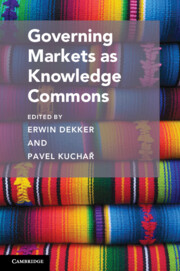Governing Markets as Knowledge Commons
Knowledge commons facilitate voluntary private interactions in markets and societies. These shared pools of knowledge consist of intellectual and legal infrastructures that both enable and constrain private initiatives. This volume brings together theoretical and empirical approaches that develop and apply the Governing Knowledge Commons framework to the evolution of various kinds of shared knowledge structures that underpin exchanges of goods, services, and ideas. Chapters offer vivid and illuminating case studies that illustrate this conceptual framework. How did pooling scientific knowledge enable the Industrial Revolution? How do social networks underpin the credit system enabling the Agra footwear market? How did the market category Scotch whisky emerge and who has access to it? What is the potential of blockchain-ledgers as shared knowledge repositories? This volume demonstrates the importance of shared knowledge in modern society.
- Illustrates and conceptualizes the cultural effects of markets
- Contains a wide variety of global case-studies from both traditional markets and new technologies
- Takes an interdisciplinary approach drawing from economics, sociology, anthropology, and history
Product details
December 2021Adobe eBook Reader
9781108751933
0 pages
This ISBN is for an eBook version which is distributed on our behalf by a third party.
Table of Contents
- Introduction. Governing markets as knowledge commons Erwin Dekker and Pavel Kuchař
- 1. The contribution good as the foundation of the industrial revolution Terence Kealey and Martin Ricketts
- 2. On the social evolution of knowledge Renée Prendergast
- 3. Individual sovereignty and coproduction of knowledge governance Edward J. López
- 4. Common sense commons: the case of commonsensical social norms Brett Frischmann
- 5. Conventions as shared cognitive infrastructures Young Back Choi
- 6. Property rights, knowledge commons, and blockchain governance Darcy W. E. Allen, Chris Berg, Sinclair Davidson, and Jason Potts
- 7. Knowledge commons, social infrastructures, and informal markets: the case of informal trade credit in India Yugank Goyal
- 8. Entrepreneurship and governance in the Scotch whisky knowledge commons Michelle Albert Vachris and Kyle Vachris
- 9. Trolling in the deep: managing transgressive content on online platforms as a commons Julien Gradoz and Raphaël Raux
- 10. Crowdfunding the Queer Museum: a polycentric identity quarrel Carolina Dalla Chiesa
- 11. Understanding different qualities of the knowledge commons in contemporary cities Youn Sun Won and Arjo Klamer.











